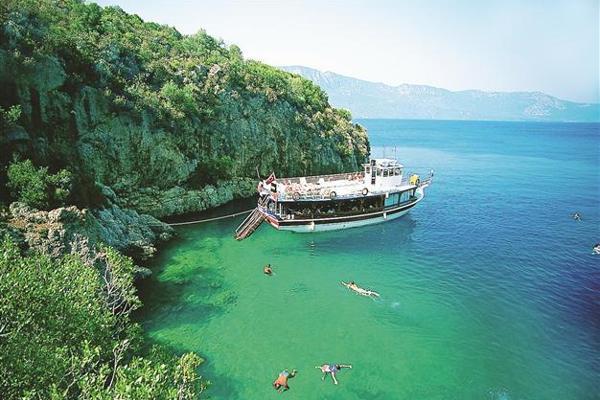Slow city to apply for protection of heritage
AKYAKA - Anatolia News Agency


The area around Akyaka is full of endemic plant and endangered animal species, making it a suitable candidate for UNESCO. Hürriyet photos
As representatives work to protect the area of Akyaka by applying to UNESCO, a new municipality law has made the town merely a neighborhood of Ula in the greater Muğla province.Akyaka, which was recently admitted to the International Slow City Association (Cittaslow), is now preparing to apply to UNESCO for protection of its cultural heritage.
After being selected for Cittaslow, Akyaka began to attract many tourists, the town’s mayor, Ahmet Çalca said, adding that the town is different from others in terms of its approach to tourism.
Turkey’s new municipality law will heavily affect the area, making Akyaka a part of the Ula district, Çalca said. This change might harm the area, according to Çalca. Akyaka is currently under protection and, according to Çalca, it is a must to continue protecting the area’s heritage. However, the latest law may harm the city’s future.
Slow city since 2010
The area around Akyaka is full of endemic plant and endangered animal species making it a suitable candidate for UNESCO, according to Çalca.
The town of Akyaka in the Aegean province of Muğla was designated a “slow city” in 2010 by an organization inspired by the “slow food” movement, Cittaslow International. It was deemed a great destination for those seeking to enjoy a calm and relaxing holiday.
Most visitors find their way to Akyaka for the Nail Çakırhan House and Azmak Stream, which is a great locale for scuba diving. The area also boasts a natural park with archeological sites. “We need to be worried about protecting such as place for the future,” Çalca said.
After the town began to attract more attention from local and foreign tourists when it was named a slow city in 2010, a series of improvements were made to the riverside and around the popular Sedir Island in preparation for the Bayram holiday, the mayor said. “We ask our visitors to be very careful when using the picnic areas. Our town’s natural environment has so far been preserved in the best possible way and we are trying to do our best to preserve it for future generations. This place is a heritage for them.”
Akyaka’s tourist facilities include 2,200 hotel beds and a tent camping area suitable for 400 people, Çalca said. “With Bayram reservations, the occupancy rate in the town is at 90 percent.”
Akyaka also hosts day visitors from cities like Aydın and Denizli. “Day visitors generally go to Akbük, the kitesurfing area and Azmak Beach. Akyaka is one of the most beautiful holiday towns in the country for those who want to spend a relaxing holiday,” Çalca said.
Municipalities that join the International Slow City Association, known more commonly as Cittaslow, seek a return to simpler times. They look to reinstate a forgotten way of being. They adopt the slow and healthy succession of the seasons, are respectful of citizens’ health, concerned with the authenticity of products and food, want to revive traditional arts and crafts, to protect historical locations and monuments and embrace the joy of slow and quiet living.
Slow trade versus quick activities
With slow tourism or trade, people resist the idea of conducting their visits or their trade activities quickly. The aim is to find a modern-day counterpart to life as it was once lived, incorporating the best bits of the past and enjoying them in the context of the present-day. A slow town resists homogenization, respecting local variations and enabling its inhabitants to lead a calmer and healthier lifestyle. It is also more environmentally sustainable.
The slow food movement, which strives to preserve regional and traditional cuisine, together with the cities that mirror these ideas in their identities, are helping to build the Cittaslow international network.
According to the Cittaslow Manifesto, the committee is looking for “towns where men are still curious of the old times, towns rich in theaters, squares, cafes, workshops, restaurants and spiritual places, towns with untouched landscapes and charming craftsman where people are still able to recognize the slow course of the seasons and their genuine products; respecting tastes, health and spontaneous customs.”
